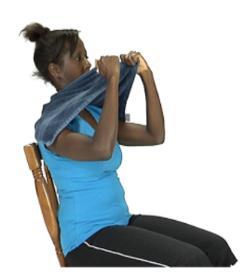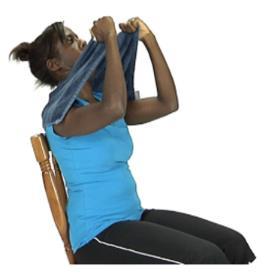Introduction
➢ Surgery and Radiation treatment are both common forms of interventions for patients with Head & Neck Cancer.
➢ What happens with surgery & radiation treatment?
• These treatments can make your muscles and soft tissue (e.g. ligaments, skin) stiff and tight.
• If muscles and soft tissues tighten it can cause pain, change in posture and affect joint mobility.
• Acute stiffness and tightness can be seen immediately after radiation has ended, but can also last for a long time (months and even years) after radiation is completed.
➢ Why should exercises be done?
• To prevent stiffness and tightness in the muscles, joints and soft tissue exposed to surgery and radiotherapy.
• To improve range of motion and movement restrictions that may develop in the head & neck region.
• To improve lymphatic system flow to minimize lymphedema (swelling) of the head & neck.
• To strengthen head & neck muscles and prevent postural issues from developing.
• To improve independence in activities of daily living (i.e. talking, eating).
1. Good Postural Alignment
➢ Imagine a string pulling your head up tall:
• Sit or stand tall with feet firmly planted with weight equally distributed.
• Keeping the chin slightly tucked, lengthen the back of the neck, focusing on an object at eye level.
• Lift up chest to straighten out your trunk.
• Tuck in belly button towards your spine.
• Try to keep this good posture for all the following exercises.

2. Shoulder Retraction
➢ Sitting on a chair/standing in front of mirror with good postural alignment
➢ Rotate arms so thumbs are pointing out and back (palm facing out) to open the chest wall.

➢ Squeeze the shoulder blades together, while keeping the chin tucked.
Image: Physiotec
Hold 3 5 sec
Image: Physiotec
 ©MUHC Lymphedema Clinic
©MUHC Lymphedema Clinic
3. Neck Retraction
➢ Sitting on a chair/standing in front of mirror with good postural alignment.
➢ Focus on an object at eye level.
➢ Gently slide your head towards the back of your spine.
➢ Tuck your chin in (guide the movement with hand as shown).
4. Neck Extension

➢ Sitting on a chair/standing in front of mirror with good postural alignment.

➢ Using a folded towel, place it behind neck to support your head.
➢ Gently look upwards towards ceiling until you feel a light stretch in your neck, not discomfort/pain.
5. Neck Rotation
➢ Sitting on a chair/standing in front of mirror with good postural alignment.
➢ Gently place right hand behind your lower back.
➢ Slowly rotate head to the left bringing chin towards the shoulder and look to the side.
➢ Apply gentle pressure to right cheek/chin to feel stretch on the right side of the neck.



❖ Do the same stretch on the other side.
6. Neck Side-Flexion


➢ Sitting on a chair/standing in front of mirror with good postural alignment.
➢ Lower left arm down by holding side of chair.
➢ Slowly bend your neck towards the right shoulder and pull gently with right hand to feel the stretch on the left side of your neck.
❖ Do the same stretch on the other side
Hold 3 5 sec Reps 5 10 times Sets 2 3 sets X / day 1 2x/day
Image: Physiotec
Hold 3 5 sec Reps 5 10 times Sets 2 3 sets X / day 1 2x/day

Image: Physiotec
Hold 10 15 sec Goal 30 60 sec
Reps 3 5 times X / day 2 3x/day
Image: Physiotec
Hold 10 15 sec Goal 30 60 sec
Reps 3 5 times X / day 2 3x/day
Image: Physiotec
7. Neck Combined Rotation and Extension

➢ Sitting on a chair/standing in front of mirror with good postural alignment.
➢ Lower right arm down by holding side of chair.
➢ Slowly rotate your neck towards the left and look upwards towards the ceiling/stars.
➢ Apply gentle pressure to right cheek/chin to feel stretch on the right side of your neck.
❖ Do the same stretch on the other side.
8. Neck Combined Rotation and Flexion
➢ Sitting on a chair/standing in front of mirror with good postural alignment.
➢ Lower right arm down by holding side of chair.

➢ Slowly rotate your neck towards the left and look downwards toward armpit
➢ Apply gentle pressure on your head to feel the stretch on the right side of your neck.

❖ Do the same stretch on the other side.
9. Shoulder Blade Squeezes
➢ Sitting on a chair/standing in front of mirror with good postural alignment.
➢ Stand with your elbows close to your body.
➢ Bent your elbows to 90 degrees and turn them out.
➢ Squeeze your shoulder blades together.
©MUHC Lymphedema Clinic
Hold 10 15 sec Goal 30 60 sec Reps 3 5 times X / day 2 3x/day
Image: Physiotec
Hold 3 5 sec Goal 30 60 sec Reps 3 5 times X / day 2 3x/day
Image: Physiotec
Hold 5 sec Reps 3 5 times Goal 10 times X / day 2 3x/day
Image: Physiotec
10.Shoulder Range of Motion
➢ Make sure you have good postural alignment for exercise.
➢ Lie on your back, knees bent to protect your spine and tighten your abdominals.
➢ Clasp your hands together and raise them over your head until you feel a stretch.
11.Chest Wall Opening
➢ Make sure you have good postural alignment for exercise.
➢ Lie on your back, knees bent to protect your spine and tighten your abdominals.


➢ Place hands behind your head
➢ Let your elbows fall out to the sides so that you feel a stretch in the front of your chest.


©MUHC Lymphedema Clinic
Hold 10 15 sec Goal 30 60 sec Reps 3 5 times X / day 2 3x/day
Image: Physiotec
Hold 10 15 sec Goal 30 60 sec Reps 3 5 times X / day 2 3x/day
Image: Physiotec
Self Manual Lymph Drainage (Self MLD)
➢ Self MLD is a gentle massage done directly on your skin that helps move swelling from damaged area(s) toward an area of healthy drainage.
➢ Cancer treatment may have damaged your lymph nodes and lymphatic vessels (surgery and/or radiation therapy).
➢ This gentle massage allows the lymphatic fluid to be rerouted and avoid buildup of lymphatic fluid from accumulating up in the head, face and neck region.

➢ Self MLD should not be used alone, but in conjunction with compression and/or specific head and neck exercises.
1. Self MLD: Deep Breathing
➢ Sitting on a chair/standing in front of mirror with good postural alignment
➢ Place your hands on your lower rib cage.
➢ Inhale deeply, feeling sides of rib cage expand.
➢ Exhale slowly with lips slightly closed (pursed lips)
2. Self MLD: Shoulder Roll
➢ Sitting on a chair/standing in front of mirror with good postural alignment.
➢ Arms relaxed on the side of your body.
➢ Gently roll your shoulders toward the back making big circles (no arm movements).



3. Self-MLD: Neck Rotation
➢ Sitting on a chair/standing in front of mirror with good postural alignment.
➢ Place your left hand on the left side of your neck.
➢ Slowly turn your head toward the right side (your hand will automatically slide toward the back of your neck).
➢ Remove the contact of your hand with your neck and bring your head back to the center to repeat massage.
❖ Do the same on the other side.
Reps 5 10 times X / day 2 3x/day
Image: Physiotec
Reps 5 10 times X / day 2-3x/day
Image: Physiotec

Reps 5 10 times X / day 2 3x/day
Image: MUHC
